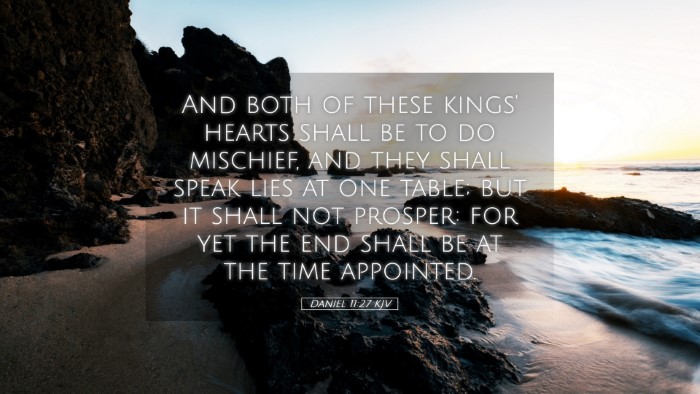Commentary on Daniel 11:27
Verse Context: Daniel 11:27 states, "And both these kings' hearts shall be to do mischief, and they shall speak lies at one table; but it shall not prosper: for yet the end shall be at the time appointed." This verse is situated within a profound prophetic narrative, detailing the conflict between two significant rulers and their eventual downfall.
General Observations
This verse illustrates the duplicitous nature of political alliances and the futility of their schemes. The "two kings" represent political powers that may outwardly appear unified but are inwardly corrupt. In their discussions, intentions of treachery and deceit dominate their interactions.
Commentary Insights from Matthew Henry
Matthew Henry expounds on the human propensity for deception, noting that even in collaborative environments, malevolent intents can reside. He underscores that the affairs of kingdoms and political rulers are often infused with treachery. The phrase "speak lies at one table" implies that their plotting occurs in a façade of fellowship, showcasing the irony of their situation.
Key Points from Henry:
- Human Nature: The nature of kings is to seek their personal gains, often compromising their integrity.
- Divine Sovereignty: Despite their schemes, God's ultimate purpose prevails, indicating that evil does not have the final say.
- Covenantal Trust: Believers can take solace in knowing that God has environments planned where righteousness will ultimately triumph over deceit.
Insights from Albert Barnes
Albert Barnes notes that the kings dealt with in this verse symbolize those with potent political influence yet lacking moral compass. He emphasizes the inevitability of their downfall due to their corrupt intentions, as true prosperity can only stem from honest and just dealings.
Key Points from Barnes:
- Futility of Misdemeanors: The attempts at manipulation highlighted in the verse will not yield the results the kings anticipate.
- Predestined Outcomes: The phrase "yet the end shall be at the time appointed" suggests that while they plot, a divine schedule is set concerning the unfolding of history.
- Encouragement for the Faithful: For believers, this serves as a reminder that God’s timetable will prevail, offering hope amid temporal trials.
Reflections by Adam Clarke
Adam Clarke provides a comprehensive view of the political climate during the time of this prophetic pronouncement. He highlights that deceit in diplomacy not only draws the involved parties away from truth but also impacts their futures drastically.
Key Points from Clarke:
- Nature of Alliance: Clarke emphasizes the superficiality of alliances based on deceit, which are bound to crumble under stress.
- Spiritual Principle: The verse serves as a warning against reliance on human schemes; true security comes from dependence on divine wisdom and guidance.
- Historical References: He also examines the historical implications, linking them to specific rulers and their reigns, emphasizing the prophetic accuracy of Daniel's insights.
Theological Implications
The message in Daniel 11:27 transcends its immediate political context, revealing fundamental truths about the nature of human governance versus divine governance. It serves as a cautionary tale about the ephemeral nature of sinful plans against the unchangeable purposes of God.
Corruption and Consequences
Despite the apparent success of scheming entities, the commentary collectively emphasizes that corruption ultimately leads to divine retribution. God's overarching sovereignty ensures that even the most powerful rulers cannot thwart His plans.
Hope for Believers
For pastors and theologians, this verse encourages preaching about the importance of integrity and reliance on God's power rather than human wisdom. It affirms the belief that God is in control of our circumstances, and His purposes will be achieved regardless of human intrigue.
Conclusion
In closing, Daniel 11:27 serves not only as an admonition concerning the pitfalls of deceitful alliances among powerful figures but also as a source of encouragement for the faithful. The trust that believers can place in God's ultimate plan resonates throughout the commentary, affirming that while human beings may conspire, God's will prevails — for there is a time appointed when truth and justice will ultimately triumph.


